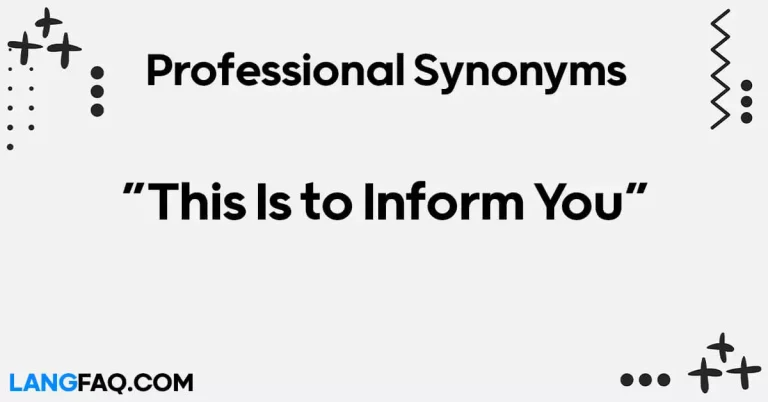In the dynamic landscape of professional interactions, expressing the cessation of services requires finesse. This article delves into 12 alternative ways to convey the message effectively and professionally. From subtle nuances to direct communication, explore various approaches to navigate this delicate conversation.
12 Other Ways to Say “Your Services Are No Longer Required”
Here are 12 alternative ways to say “Your Services Are No Longer Required”:
- “We’ve Concluded Our Collaboration”
- “Our Partnership Has Reached Its Conclusion”
- “We’re Wrapping Up Our Engagement”
- “Our Professional Affiliation Is Finalizing”
- “Closing Our Business Association”
- “Terminating Our Service Agreement”
- “The Conclusion of Our Cooperation”
- “Your Services Are No Longer Needed”
- “We’re Concluding Our Professional Relationship”
- “The Dissolution of Our Partnership”
- “Ceasing Our Professional Collaboration”
- “Our Business Relationship Has Come to an End”
Here’s a table with meanings and examples for the alternative ways to say “Your Services Are No Longer Required”:
| Phrase | Meaning | Example |
|---|---|---|
| We’ve Concluded Our Collaboration | Signifying the end of working together | “After careful consideration, we’ve concluded our collaboration.” |
| Our Partnership Has Reached Its Conclusion | Indicating the formal end of a partnership | “Regrettably, our partnership has reached its conclusion.” |
| We’re Wrapping Up Our Engagement | Expressing the closure of professional involvement | “It’s time to wrap up our engagement and move in different directions.” |
| Our Professional Affiliation Is Finalizing | Conveying the formalization of the conclusion of a professional connection | “The board has decided our professional affiliation is finalizing.” |
| Closing Our Business Association | Signifying the termination of a business association | “Effective immediately, we are closing our business association.” |
| Terminating Our Service Agreement | Clearly stating the end of a service agreement | “Due to unforeseen circumstances, we are terminating our service agreement.” |
| The Conclusion of Our Cooperation | Describing the end of a cooperative effort | “The successful conclusion of our cooperation is appreciated.” |
| Your Services Are No Longer Needed | Directly communicating the lack of requirement for services | “I regret to inform you that your services are no longer needed.” |
| We’re Concluding Our Professional Relationship | Indicating the formal end of a professional connection | “After careful consideration, we’re concluding our professional relationship.” |
| The Dissolution of Our Partnership | Expressing the formal end and breakdown of a partnership | “The board has decided on the dissolution of our partnership.” |
| Ceasing Our Professional Collaboration | Indicating the cessation of working together professionally | “Effective immediately, we are ceasing our professional collaboration.” |
| Our Business Relationship Has Come to an End | Clearly stating the conclusion of a business relationship | “Unfortunately, our business relationship has come to an end.” |
This table provides a diverse range of phrases to delicately convey the message “Your Services Are No Longer Required.” Each alternative phrase offers a nuanced way to communicate the conclusion of professional relationships or collaborations. Whether aiming for formality or softening the impact, these expressions provide a toolbox for effective and considerate communication during periods of change. Choosing the right phrase depends on the context and desired tone, allowing for flexibility in navigating delicate conversations surrounding the conclusion of services.
Is It Correct to Say “Your Services Are No Longer Required”?
Yes, the phrase “Your Services Are No Longer Required” is grammatically correct and commonly used in professional and business contexts. It is a straightforward and formal way to communicate the termination or conclusion of someone’s services, job role, or professional engagement.
When to Use: This phrase is typically employed when notifying an individual, employee, contractor, or service provider that their services are no longer needed due to various reasons such as organizational changes, restructuring, or the completion of a specific project.
Example Sentences:
- “Dear [Employee’s Name], regrettably, we have to inform you that, effective [date], your services are no longer required due to the recent restructuring.”
- “As of [date], we want to notify you that, unfortunately, your services are no longer required in this capacity.”
Usage Tips:
- Always pair this phrase with a degree of empathy and appreciation, acknowledging the individual’s contributions or the positive aspects of their work.
- Consider providing additional information or context for a clearer understanding of the reasons behind the decision.
- Ensure that the communication is clear, concise, and professional, maintaining a respectful tone.
Variations: To adapt the phrase for different situations or relationships, you can use alternatives like:
- “Your Position Is No Longer Necessary”
- “We’re Concluding Our Collaboration”
- “Our Business Relationship Has Come to an End”
Professional Mail Example With “Your Services Are No Longer Required”
Subject: Important Notice – Conclusion of Your Role
Dear [Employee’s Name],
I trust this message finds you well. I am writing to inform you that, regrettably, effective [date], your services are no longer required in your current role at [Company Name].
This decision has been made after careful consideration of various factors, including recent organizational changes and the need to reallocate resources to meet our evolving business requirements. We want to express our sincere gratitude for the contributions you have made during your time with us. Your dedication and hard work have been valuable to the team.
We understand that this news may come as a surprise, and we want to assure you that this decision was not made lightly. We are committed to supporting you through this transition. Our HR department will provide you with details regarding the necessary processes, including any severance packages, benefits continuation, or assistance with job placement.
We encourage you to schedule a meeting with our HR representative at your earliest convenience to discuss any questions you may have or to seek additional information. Your cooperation during this period is appreciated.
We sincerely wish you the best in your future endeavors. Your professionalism and contributions to [Company Name] have not gone unnoticed, and we hope our paths cross again in the future.
Thank you for your understanding.
Kind regards,
[Your Full Name] [Your Position] [Company Name] [Contact Information]
We’ve Concluded Our Collaboration
In the realm of professional relationships, there comes a time when collaborative efforts reach their natural conclusion. The phrase “We’ve Concluded Our Collaboration” offers a formal and respectful way to communicate this closure.
Scenario: Imagine you’ve been collaborating on a project with a colleague, and the project has reached its successful completion. In a formal email to your colleague, you might write:
Subject: Conclusion of Our Collaborative Project
Dear [Colleague’s Name],
I trust this message finds you well. I wanted to express my gratitude for our exceptional collaboration on [Project Name]. It is with great satisfaction that I share that we’ve concluded our collaboration successfully. Your dedication and contributions have been invaluable, and I look forward to the opportunity to work together again in the future.
Best regards, [Your Name]
Variations:
- Between colleagues: “Our Project Collaboration Has Come to an End”
- In a mentor-mentee context: “Concluding Our Mentorship Collaboration”
Grammar/Usage Tip: When using this phrase, it’s essential to maintain a positive and appreciative tone, highlighting the achievements and contributions during the collaboration.
Our Partnership Has Reached Its Conclusion
For more formal business associations or partnerships, the phrase “Our Partnership Has Reached Its Conclusion” conveys a sense of closure while maintaining professionalism.
Scenario: Suppose you are a business owner informing a partner about the end of your business collaboration. Your email might read:
Subject: Formal Conclusion of Our Partnership
Dear [Partner’s Name],
I hope this message finds you in good health. It is with a mix of gratitude and reflection that I communicate that our partnership has reached its conclusion. Our collaborative journey has been enriching, and I appreciate the dedication and commitment you brought to our shared endeavors. Wishing you continued success in your future endeavors.
Warm regards, [Your Name]
Variations:
- In a formal business email: “Concluding Our Business Partnership”
- Between friends in business: “The Formal End of Our Business Ventures”
Dictionary Insight: According to the Cambridge Dictionary, the word “conclusion” signifies the act of ending something or the final part of something.
Pros and Cons: Using “Our Partnership Has Reached Its Conclusion” adds formality and clarity to the communication. However, it may sound more rigid compared to other phrases.
We’re Wrapping Up Our Engagement
When working on a project or task, the phrase “We’re Wrapping Up Our Engagement” offers a positive and collaborative way to convey the conclusion.
Scenario: In a team setting, after successfully completing a project, you might share the news with your team:
Subject: Wrapping Up Our Project Engagement
Dear Team,
I’m delighted to share that we are wrapping up our engagement on the [Project Name]. It has been a journey marked by teamwork, dedication, and success. Your collective efforts have been instrumental, and I look forward to celebrating our achievements together.
Best regards, [Your Name]
Variations:
- In a casual team setting: “Closing Out Our Team Project”
- Between collaborators: “Ending Our Creative Engagement”
Grammar/Usage Tip: “Wrapping Up Our Engagement” implies a positive and celebratory tone, making it suitable for team environments and creative collaborations.
Our Professional Affiliation Is Finalizing
In formal contexts, especially in professions or organizations, the phrase “Our Professional Affiliation Is Finalizing” is appropriate for communicating the conclusion of a formal relationship.
Scenario: As a representative of an organization, informing a colleague about the conclusion of a professional connection might look like this:
Subject: Formal Notification – Finalization of Our Professional Affiliation
Dear [Colleague’s Name],
I trust this message finds you well. It is with a sense of responsibility and respect that I inform you about the finalization of our professional affiliation. Your contributions have been commendable, and I extend my gratitude for your dedicated service during our association. I wish you continued success in your future endeavors.
Kind regards, [Your Name]
Variations:
- In a professional organization: “Formalizing the Conclusion of Our Professional Affiliation”
- Between industry peers: “Concluding Our Industry Partnership”
Grammar/Usage Tip: Maintaining a formal tone and acknowledging the contributions of the other party is crucial when using this phrase. It conveys professionalism and gratitude simultaneously.
Closing Our Business Association
In the corporate world, where formalities are essential, the phrase “Closing Our Business Association” offers a clear and precise way to communicate the end of a business relationship.
Scenario: Suppose you’re a business owner terminating a contractual business relationship. Your formal email might read:
Subject: Formal Announcement – Closing Our Business Association
Dear [Business Partner’s Name],
I hope this message finds you in good health. It is with a sense of duty that I announce the formal closing of our business association, effective [date]. This decision has been reached after careful consideration, and I appreciate the professionalism and commitment you have demonstrated throughout our partnership. Wishing you continued success in your future endeavors.
Best regards, [Your Name]
Variations:
- Between business associates: “Concluding Our Corporate Partnership”
- In a more casual business setting: “Informal Announcement – Ending Our Business Ties”
Dictionary Insight: The term “association” refers to a connection or cooperative link between people or organizations, emphasizing collaboration.
Pros and Cons: “Closing Our Business Association” is straightforward and formal, ensuring clarity in communication. However, it may lack the personal touch present in less formal phrases.
Terminating Our Service Agreement
In contractual scenarios where precision is crucial, the phrase “Terminating Our Service Agreement” provides a straightforward and legally clear way to communicate the end of a service arrangement.
Scenario: If you’re a service provider informing a client about the termination of a service agreement, your formal email might look like this:
Subject: Official Notice – Termination of Our Service Agreement
Dear [Client’s Name],
I trust this message finds you well. It is with a sense of responsibility that I formally notify you regarding the termination of our service agreement, effective [date]. This decision follows careful consideration, and we appreciate the opportunity to have served your needs. Please find attached detailed information regarding the conclusion of our contractual obligations.
Kind regards, [Your Name]
Variations:
- In a service-oriented industry: “Formal Termination of Our Service Contract”
- Between collaborators on a project: “Concluding Our Service Collaboration”
Grammar/Usage Tip: When using this phrase, attaching a detailed document outlining the termination terms can provide clarity and prevent misunderstandings.
The Conclusion of Our Cooperation
For a more formal and encompassing expression, “The Conclusion of Our Cooperation” can be used to signify the end of a collaborative effort.
Scenario: Suppose you’re addressing a group of collaborators or partners about the successful conclusion of a joint initiative. Your message might be:
Subject: Announcement – Successful Conclusion of Our Cooperation
Dear Team,
I am thrilled to announce the successful conclusion of our cooperation on [Project Name]. The dedication and synergy displayed throughout this endeavor have been exemplary. Each contribution has played a vital role in our shared success. I look forward to the possibility of future collaborations.
Best regards, [Your Name]
Variations:
- In a professional setting: “Formal Announcement – Ending Our Cooperative Effort”
- Among industry peers: “Concluding Our Collaborative Endeavor”
Dictionary Insight: “Cooperation” implies the action or process of working together toward a common end or purpose, highlighting shared efforts.
Pros and Cons: “The Conclusion of Our Cooperation” emphasizes the collective effort, fostering a sense of shared accomplishment. However, it may sound slightly formal for less official collaborations.
Your Services Are No Longer Needed
In situations requiring directness, the phrase “Your Services Are No Longer Needed” communicates the termination of services in a clear and concise manner.
Scenario: Addressing an employee or service provider about the conclusion of their role, a formal email might look like this:
Subject: Important Notice – Termination of Services
Dear [Recipient’s Name],
I trust this message finds you well. It is with a sense of responsibility that I convey that, regrettably, your services are no longer needed, effective [date]. This decision has been made after thorough evaluation, and we appreciate the contributions you have made during your tenure. Wishing you success in your future endeavors.
Kind regards, [Your Name]
Variations:
- In a more casual business setting: “Informal Notice – Ending Our Work Together”
- Between colleagues: “Regretful Announcement – The Conclusion of Our Collaborative Effort”
Grammar/Usage Tip: While direct, it’s crucial to pair this phrase with expressions of gratitude and best wishes to soften the impact.
We’re Concluding Our Professional Relationship
For a comprehensive and formal approach, “We’re Concluding Our Professional Relationship” indicates the cessation of a professional connection with respect and formality.
Scenario: Addressing a business associate or colleague about the formal end of your professional relationship might look like this:
Subject: Formal Announcement – The Conclusion of Our Professional Relationship
Dear [Associate’s Name],
I hope this message finds you in good health. It is with mixed emotions that I inform you of the conclusion of our professional relationship, effective [date]. Your contributions have been invaluable, and I appreciate the collaborative spirit you brought to our shared projects. Wishing you continued success in your future endeavors.
Warm regards, [Your Name]
Variations:
- In a mentor-mentee context: “Formal Closure – Concluding Our Mentorship Relationship”
- Between industry peers: “Acknowledging the End – The Formal Termination of Our Business Ties”
Dictionary Insight: “Relationship” signifies the way in which two or more concepts, objects, or people are connected or the state of being connected.
Pros and Cons: “We’re Concluding Our Professional Relationship” provides a formal tone suitable for diverse professional connections. However, it may sound more structured than phrases with a lighter touch.
The Dissolution of Our Partnership
In scenarios where a formal business partnership is coming to an end, “The Dissolution of Our Partnership” communicates a clear and legally recognized conclusion.
Scenario: If you’re a business owner notifying a partner about the termination of your partnership, a formal email might look like this:
Subject: Formal Announcement – The Dissolution of Our Partnership
Dear [Partner’s Name],
I trust this message finds you well. It is with a sense of duty and respect that I announce the formal dissolution of our partnership, effective [date]. This decision follows careful consideration, and I appreciate the dedication and professionalism you have brought to our collaborative ventures. Wishing you continued success in your future endeavors.
Best regards, [Your Name]
Variations:
- In a more casual business setting: “Informal Notice – Ending Our Business Ventures”
- Between long-term collaborators: “Acknowledging the End – The Formal Termination of Our Collaboration”
Dictionary Insight: “Dissolution” refers to the action or process of formally ending or dismissing an official body or partnership.
Pros and Cons: “The Dissolution of Our Partnership” is clear and formal, ensuring clarity in communication. However, it may sound more rigid compared to phrases with a softer touch.
Ceasing Our Professional Collaboration
In scenarios where a professional collaboration is ending, the phrase “Ceasing Our Professional Collaboration” strikes a balance between formality and approachability.
Scenario: When addressing a team about the conclusion of a collaborative project, your message might be:
Subject: Announcement – Ceasing Our Professional Collaboration
Dear Team,
I am writing to inform you that we are ceasing our professional collaboration on [Project Name]. The effort and creativity each of you contributed have been remarkable, and I want to express my gratitude for the positive working relationship we’ve maintained throughout. Looking forward to the possibility of future collaborations.
Best regards, [Your Name]
Variations:
- In a creative industry: “Closing Out Our Creative Collaboration”
- Among industry peers: “Acknowledging the End – Ceasing Our Joint Endeavor”
Grammar/Usage Tip: “Ceasing Our Professional Collaboration” conveys the conclusion with a slightly more casual tone, making it suitable for various professional settings.
Our Business Relationship Has Come to an End
In situations requiring a more straightforward yet respectful approach, “Our Business Relationship Has Come to an End” communicates the termination of a business association with clarity.
Scenario: Addressing a business associate or client about the end of your business relationship might look like this:
Subject: Formal Notice – The Conclusion of Our Business Relationship
Dear [Client’s Name],
I hope this message finds you well. It is with a mix of emotions that I convey the formal end of our business relationship, effective [date]. Your trust and collaboration have been invaluable, and I appreciate the positive working relationship we’ve had. Wishing you success in all your future endeavors.
Warm regards, [Your Name]
Variations:
- In a more casual business setting: “Informal Announcement – Ending Our Business Ties”
- Between long-term collaborators: “Acknowledging the Conclusion – The Formal Termination of Our Business Association”
Dictionary Insight: “Relationship” emphasizes the way in which two or more entities are connected, highlighting the personal and professional aspects of the association.
Pros and Cons: This phrase is clear and direct, suitable for formal business relationships. However, it may lack the softer touch present in more informal expressions.
Your Services Are No Longer Necessary
For a slightly softer tone while maintaining clarity, “Your Services Are No Longer Necessary” communicates the end of services with a touch of formality.
Scenario: If you’re a supervisor or manager informing an employee about the cessation of their role, your formal email might read:
Subject: Important Notice – Conclusion of Your Role
Dear [Employee’s Name],
I trust this message finds you well. It is with a sense of duty that I convey that, regrettably, your services are no longer necessary, effective [date]. I want to express my gratitude for your contributions during your time with us. Wishing you the best in your future endeavors.
Kind regards, [Your Name]
Variations:
- In a more casual team setting: “Informal Notice – Ending Our Work Together”
- Among colleagues: “Acknowledging the End – The Conclusion of Our Team Collaboration”
Grammar/Usage Tip: “Your Services Are No Longer Necessary” maintains a formal tone while incorporating a degree of empathy, acknowledging the contributions of the individual.
Frequently Asked Questions (FAQs)
Q: How should I approach employees when conveying changes in staffing? A: When communicating changes, transparency is key. Clearly articulate the reasons behind the decision and emphasize the organization’s commitment to employee success.
Q: What if the changes are due to performance issues? A: Address performance concerns constructively, focusing on improvement opportunities. Offer support, such as training or mentorship, to help the individual grow.
Q: Is it advisable to use casual language when announcing the end of services? A: While maintaining professionalism is crucial, adapting your language to the company culture is recommended. Strive for a balance between formality and approachability.
Q: How can I ensure a smooth transition after announcing changes? A: Provide support mechanisms, such as transition assistance or resources for skill development. Foster open communication to address concerns and questions.
Q: Should I communicate changes individually or in a group setting? A: The approach depends on the nature of the changes. For significant organizational shifts, a combination of group and individual communication may be effective.
Q: What legal considerations should be taken into account when announcing the end of services? A: Consult with legal professionals to ensure compliance with employment laws and contractual obligations. Consider providing written documentation outlining the changes.
Conclusion:
Navigating the communication of the end of services requires a thoughtful and strategic approach. By exploring these 12 alternative ways and considering the FAQs, you can enhance your communication skills, fostering a positive and respectful environment during periods of transition.







